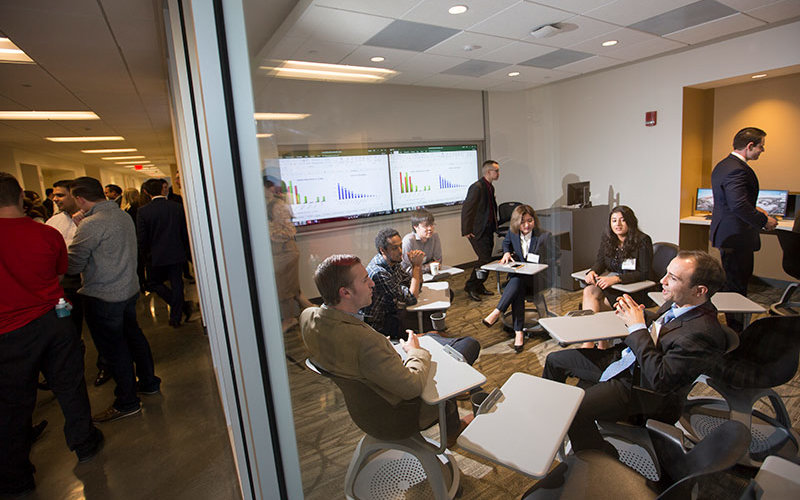
Charting stocks and bonds these days mimics a roller coaster’s deep dives and progressive uphill climbs. The market’s erratic undulation puts Cal State Fullerton business students in the Applied Security Analysis Program in the coveted front car for the exhilarating ride.
“It’s like the Super Bowl of the stock market,” says Christian Escalante, an ASAP bond team member and a senior studying finance and minoring in economics. “We have to keep up with what’s going on the in the world.”
Twice weekly, ASAP teams of students huddle in a high-tech hub on the second floor of Mihaylo Hall, building their future careers as investors, securities analysts and money managers.
What’s at risk? About $1.5 million in stocks and bonds.
Here, in the Titan Capital Management center, the teams access Bloomberg software — the same market data that drives trading floors of the same global finance and investment operations that seek these future Titans of the industry. Students study how unemployment and politics influence the market and examine trends to predict behavior before investing real capital in real time.
The immersive experience resembles a slow and methodical race to boost earnings. On the scoreboard: Bailing on retail stocks in the fall was a win. Missing the window to purchase performers in January, a fail.
This is no steady market. But it is a steep learning curve.
“The program allows us to explore and challenge ourselves and here, we learn the most from our mistakes,” said Ryan Lew, a senior studying finance, and a bond team member.
The teams are driven, eager to see rewards along with risk, said stock team member Eduardo Mendez, a business administration-finance major.
“I know once I get to those hedge funds, I’ll have to perform,” he said. “There are no second chances.”
Michael Milligan and Marcia Clark, faculty members in the Finance Department, each lead a seven-member group for two semesters, as the students take on the roles of portfolio manager, economist, researcher, financial analyst. Clark leads the bond team. Milligan’s two equity or stock teams compete, and the team that underperforms buys dinner for everyone at a traditional year-end celebration. The funds roll over and, in the fall, new teams come on board.
The program was made possible with an initial gift by Jeffrey Van Harte ’80 (B.A. business administration-finance), chair and chief investment officer of Jackson Square Partners. His continued support helped fund the center’s opening in 2016.
“Students are challenged to question conventional wisdom about trends in stock and bond prices and the reasoning behind security valuations,” said Clark. “Debates sparked by this analysis develop essential critical thinking, problem-solving, and communication skills which are in high demand by employers seeking new hires ready to contribute from Day 1.”
The repetition of preparing reports for a board comprised of industry executives and giving presentations in class on prospective purchases and performance analysis is more valuable than a paper portfolio, said Edith Vargas, one of only two women in ASAP.
The business administration-finance major recently argued for a short sale of Weight Watchers stock despite its deceptive 416 percent gain in the last 12 months. A celebrity spokesperson rumored to be considering a run for U.S. President and climbing value don’t negate the facts that the product seems overpriced, the competition is more affordable and the revenue is flat, she told her peers during her chart-supported presentation.
Milligan encouraged his student to also question the company’s equity, its partners, and to ask herself what the revenue would have to grow to in order to justify those stock numbers. The market’s recent ride has some people in a panic, he told students. But it’s not time to panic. Not yet, he added.
“You had a bunch of people buying into the weakness, but I don’t think there’s much to worry about. I don’t think we have a 2006 or a 2007 here,” he said. “I think 2019 or our 2020 class is going to take it on the chin hard,” he said, as the now-seasoned veterans laughed.
For Vargas, the experiences and the faculty members’ influence built her confidence to balance and analyze the information, concepts and deadlines.
“I’m also learning to be concise and say more with less; that’s difficult,” she said.
The pressure and the strategic blend of collaborative and individual performance mirror a workforce bond team member David Fischer said he’s ready for.
“This experience has allowed me to come out of my shell, in a sense, and be confident in my skills,” said the senior studying finance. “We know we have to be prepared. This is live. You know you better make a good decision.”
In March, the teams will travel to New York to watch the Nasdaq closing bell ceremony and participate in the three-day Quinnipiac Global Asset Management Education conference with more than 1,500 college students from across the map.